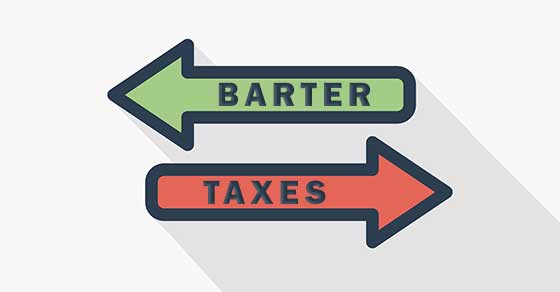Barter – Yes, it’s taxable
 Bartering: A taxable transaction even if your business exchanges no cash
Bartering: A taxable transaction even if your business exchanges no cash
It’s good to read the above sentence a couple of times before proceeding to the rest of this post.
A small local business may find it beneficial to barter for goods and services instead of paying cash for them. If your business engages in bartering, be aware that the fair market value of goods that you receive in bartering is taxable income. And if you exchange services with another business, the transaction results in taxable income for both parties.
Income is also realized if services are exchanged for property. For example, if a construction firm does work for a retail business in exchange for unsold inventory, it will have income equal to the fair market value of the inventory.
Barter clubs
Many business owners join barter clubs that facilitate barter exchanges. In general, these clubs use a system of “credit units” that are awarded to members who provide goods and services. The credits can be redeemed for goods and services from other members.
Economic value vs Taxable Income
With all the accounting hassles associated with bartering, you might wonder why anyone even considers it.
The answer is that, under the right circumstances, it can have economic value. To give an example, let’s assume that you sell carpet with a 40% Gross Margin. Let’s also assume that you exchange some carpet with a local estate planning attorney for services. Economically you’ve saved 40% of the cost of the legal work, and the attorney has income equal to the Fair Market Value of the carpet he received.
Required forms
By January 31 of each year, a barter club will send you a Form 1099-B, “Proceeds from Broker and Barter Exchange Transactions,” which shows the value of cash, property, services, and credits that you received from exchanges during the previous year. This information will also be reported to the IRS.
If you don’t contract with a barter exchange but you do trade services, you don’t file Form 1099-B; however, you may have to file a Form 1099-MISC.
Many benefits
By bartering, you can trade away excess inventory or provide services during slow times, all while hanging onto your cash. You may also find yourself bartering when a customer doesn’t have the money on hand to complete a transaction. As long as you’re aware of the federal and state tax consequences, these transactions may benefit all parties.